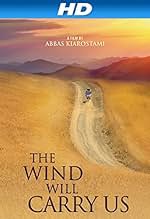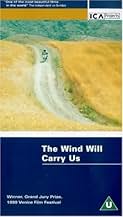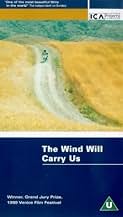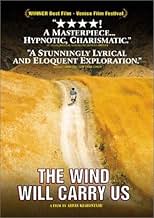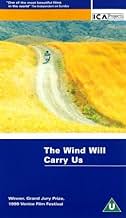PUNTUACIÓN EN IMDb
7,4/10
13 mil
TU PUNTUACIÓN
El irreverente ingeniero municipal Behzad llega a un pueblo rural iraní para cuidar a un pariente moribundo. Sigue sus esfuerzos por adaptarse a la comunidad local.El irreverente ingeniero municipal Behzad llega a un pueblo rural iraní para cuidar a un pariente moribundo. Sigue sus esfuerzos por adaptarse a la comunidad local.El irreverente ingeniero municipal Behzad llega a un pueblo rural iraní para cuidar a un pariente moribundo. Sigue sus esfuerzos por adaptarse a la comunidad local.
- Dirección
- Guión
- Reparto principal
- Premios
- 4 premios y 7 nominaciones en total
Reseñas destacadas
Another user who reviewed the film speaks of a film so full of 'symbolism' that he couldn't grasp. Maybe because it wasn't there? I'm generally not a fan of minimalism but Kiarostami grips me like no one else. I went out to take the trash after watching this and everything around me felt more alive, the nightsky, moon, trees blowing in the wind, I experienced all this in expansive vivid detail like new life was breathed into them. This is what a Kiarostami film does to me. It's about the sights and sounds of a life simple and profound in that simplicity, profound in the stoic sense of an old man sitting down in the same place every day to sip his tea. The wisdom here is not one of tremendous insight into something we didn't know, but a remembrance of something we knew and have forgotten and need to listen as the wind carries it back. Maybe the next world is beautiful muses a country doctor to our protagonist as they cross golden fields of wheat blowing in the wind, but no one has come back to tell us, so the present world is all we have; and how beautiful it is.
Beautiful Persian Zen.
The film is about waiting for something to happen, waiting for the death of an old woman which an engineer from Tehran and two of his associates have come to document; waiting for a narrative. Every now and then the engineer's cell phone rings, he has poor signal so he must rush to his car and drive to a nearby hill to get good signal. On top of the rocky hill there's a man digging a ditch, sight unseen, and the engineer idly chats with him down in his hole. That man digs up a thigh bone that once belonged to someone, the cemetery of the nearby village is on that hill, and throws it up to our curious protagonist. He stores it away in his car, a symbol of life come and gone. In the end he throws it down a creek and we see the old fickle bone flow down the water. All the symbolism in the film speaks for itself. Trees lush green and fields yellow golden with wheat and a hot dusty wind blowing over this.
I have great admiration for the way Kiarostami makes films. He's so open to the filmmaking process, no strings attached, script, rehearsal, staging, all the mechanics subordinate to the real deal. It takes balls to go into this with as little safeguards. A lot of the film seems to have been improvised on the spot, in that small Iranian village, the faces are real, their casual chitchat the casual chitchat of real people. Take him or leave him, not a lot of people can make films the way he does and make them good.
Beautiful Persian Zen.
The film is about waiting for something to happen, waiting for the death of an old woman which an engineer from Tehran and two of his associates have come to document; waiting for a narrative. Every now and then the engineer's cell phone rings, he has poor signal so he must rush to his car and drive to a nearby hill to get good signal. On top of the rocky hill there's a man digging a ditch, sight unseen, and the engineer idly chats with him down in his hole. That man digs up a thigh bone that once belonged to someone, the cemetery of the nearby village is on that hill, and throws it up to our curious protagonist. He stores it away in his car, a symbol of life come and gone. In the end he throws it down a creek and we see the old fickle bone flow down the water. All the symbolism in the film speaks for itself. Trees lush green and fields yellow golden with wheat and a hot dusty wind blowing over this.
I have great admiration for the way Kiarostami makes films. He's so open to the filmmaking process, no strings attached, script, rehearsal, staging, all the mechanics subordinate to the real deal. It takes balls to go into this with as little safeguards. A lot of the film seems to have been improvised on the spot, in that small Iranian village, the faces are real, their casual chitchat the casual chitchat of real people. Take him or leave him, not a lot of people can make films the way he does and make them good.
Typically enigmatic Kiarostami film (although one not without some deadpan comedy, and with all the inherent geographic and cultural fascination associated with his work for Western audiences) winds through his previous work and themes, and through the remote Iranian village in which it's set, as gracefully and surely as a river (a somewhat fearsome one, for all its calmness). It's about (apparently) a group of photographers or filmmakers - only one of whom is ever seen directly - awaiting a mysterious ceremony that will follow an ailing old woman's death (actually, I'm not entirely sure of the accuracy of even that broad a synopsis) but although the narrative may be in part a death watch, the film itself is "a subtle personal debate about the value of being alive" (a beautiful one-line summary by Deborah Young of Variety). The film strikes a mystical balance between its parched environment and the signs of the modern world: the process of getting the cell phone to work forms a recurring pattern, warily intertwining with fragments of old poems and evocations of antiquity, mystery and ritual. The ending was, to me, more satisfying than in his last film A Taste Of Cherry, but the film really requires a second viewing: after seeing it just once, you walk away slightly deflated - even indignant - at having largely failed its navigational challenge.
'The Wind Will Carry Us' is above all a detective story in its purest form, about the desire to know. This act of enquiry is extended to both the recording gaze of the camera and that something else emanating in the film's figurative language, the prevalance of natural objects that are what they are - trees, bridges, turtles, the wind, the river etc. - but also something else, something beautifully expressed, but only partially glimpsed, in the quotations from scripture and poetry that run through the film, from that gorgeous description at the beginning of trees as being greener than God's dreams, to the closing image of the hurled bone carried by the rapid stream down goat-chomping banks.
Such an image may remind Western viewers of Kubrick or Renoir. This is the large 'problem' with the film; rather, the problem of any viewer confronting any artwork from an alien culture. I was thinking of not even going to 'Wind', in spite of Kiarostami's reputation as THE director of the 1990s, and the fact that I loved 'Close-Up'. Early reviews made it seem dispiritingly forbidding, and who wants to go to a film if you have to read a ten-page article in 'Cineaste' to understand it? This kind of 'praise' is ultimately detrimental to the films - do we really 'get' Mizoguchi, Ray or Paradjanov films in their entirety either?
I won't lie: it's frustrating watching a film full of obviously symbolic moments that I can't grasp because I am culturally ignorant: the last ten minutes especially are baffling in their move to the ritual or abstract. The risk is to transpose Iranian figuration to their Western meanings, and thus dilute them. But, the film, as Kiarostami's are reputed to, unearth the universal through concentration on the culturally specific (although I've always found 'universality' a dubious aim).
Like I say, the film is a detective story, and if we can't solve the figurative, or metaphysical clues (although most of the poems are clear and lovely and resonant), there are other mysteries, both for the viewer and the main character. Who are these disembodied voices we hear but cannot see guiding us through a landscape at once natural, historical, poetic, social and religiously symbolic? Why have they come to this particular village? Why does the hero keep asking about this particular woman, and why does another woman keep ringing him on his borrowed mobile? Who are his shadowy companions?
Our bewilderment is shared by the 'modern' protagonist, who has to negotiate this seemingly medieval landscape with the aid of a guide (there are many fairy tale motifs throughout, from the forking roads and car breaking down, to the man getting trapped in a hole of his own making, reminding us that Iran was one of the fertile stages for the 'Arabian Nights').
This film may mean most to Iranians and pseuds, but will surely be resonant to anyone who's read Beckett, or been simply burdened with humanity - the constant waiting for something inexplicable to happen; the unseen, insistent powers that determine everything; the gallows humour of the only clear signal for a mobile phone being in a cemetary. The amazing thing about Kiarostami's famed (almost Borgesian) formalism and his metaphors is the way they arise so naturally from the realistic environment he's portraying, almost so you'd miss them - you have to look hard for the traces, the lines, the paralells, the repetitions, the angles, the reflections, the complex use of point of view that often seems literally god-like, and is of ambiguous attribution. Above all, it is a funny, engrossing, unsentimental look at people we rarely see on screen.
Such an image may remind Western viewers of Kubrick or Renoir. This is the large 'problem' with the film; rather, the problem of any viewer confronting any artwork from an alien culture. I was thinking of not even going to 'Wind', in spite of Kiarostami's reputation as THE director of the 1990s, and the fact that I loved 'Close-Up'. Early reviews made it seem dispiritingly forbidding, and who wants to go to a film if you have to read a ten-page article in 'Cineaste' to understand it? This kind of 'praise' is ultimately detrimental to the films - do we really 'get' Mizoguchi, Ray or Paradjanov films in their entirety either?
I won't lie: it's frustrating watching a film full of obviously symbolic moments that I can't grasp because I am culturally ignorant: the last ten minutes especially are baffling in their move to the ritual or abstract. The risk is to transpose Iranian figuration to their Western meanings, and thus dilute them. But, the film, as Kiarostami's are reputed to, unearth the universal through concentration on the culturally specific (although I've always found 'universality' a dubious aim).
Like I say, the film is a detective story, and if we can't solve the figurative, or metaphysical clues (although most of the poems are clear and lovely and resonant), there are other mysteries, both for the viewer and the main character. Who are these disembodied voices we hear but cannot see guiding us through a landscape at once natural, historical, poetic, social and religiously symbolic? Why have they come to this particular village? Why does the hero keep asking about this particular woman, and why does another woman keep ringing him on his borrowed mobile? Who are his shadowy companions?
Our bewilderment is shared by the 'modern' protagonist, who has to negotiate this seemingly medieval landscape with the aid of a guide (there are many fairy tale motifs throughout, from the forking roads and car breaking down, to the man getting trapped in a hole of his own making, reminding us that Iran was one of the fertile stages for the 'Arabian Nights').
This film may mean most to Iranians and pseuds, but will surely be resonant to anyone who's read Beckett, or been simply burdened with humanity - the constant waiting for something inexplicable to happen; the unseen, insistent powers that determine everything; the gallows humour of the only clear signal for a mobile phone being in a cemetary. The amazing thing about Kiarostami's famed (almost Borgesian) formalism and his metaphors is the way they arise so naturally from the realistic environment he's portraying, almost so you'd miss them - you have to look hard for the traces, the lines, the paralells, the repetitions, the angles, the reflections, the complex use of point of view that often seems literally god-like, and is of ambiguous attribution. Above all, it is a funny, engrossing, unsentimental look at people we rarely see on screen.
This is a beautiful film that celebrates life and culture. It is entirely devoted to the Forough Farrokhzad poem (cited below / I've marked it for stanza; but not for line changes), which serves as it nucleus and core.
[Stanza 1] In my small night, alas, The wind has an appointment with the trees, In my small night there is fear of devastation.
[Stanza 2] Listen. Do you hear the dark wind whispering? I look upon this bliss with alien eyes I am addicted to my sorrow Listen. Do you hear the dark wind whispering?
[Stanza 3] Now something is happening in the night The moon is red and agitated And the roof may cave in at any moment.
[Stanza 4] The clouds have gathered like a bunch of mourners And seem to be waiting for the moment of rain.
[Stanza 5] A moment And after it, nothing. Beyond this window the night trembles And the earth Will no longer turn. Beyond this window an enigma worries for you and for me.
[Stanza 6] Oh you who are so verdant Place your hands like a burning memory in my hands. And leave your lips that are warm with life To the loving caresses of my lips. The wind will carry us away, The wind will carry us away.
Enjoy it with an open and rested mind. The style is minimalist for action and words, and panoramic for scenery. It's an artful exploration of life where the viewer has to glue the pieces together, from city group's arrival and to their take-away from the experience. Details count. Don't miss any of them.
[Stanza 1] In my small night, alas, The wind has an appointment with the trees, In my small night there is fear of devastation.
[Stanza 2] Listen. Do you hear the dark wind whispering? I look upon this bliss with alien eyes I am addicted to my sorrow Listen. Do you hear the dark wind whispering?
[Stanza 3] Now something is happening in the night The moon is red and agitated And the roof may cave in at any moment.
[Stanza 4] The clouds have gathered like a bunch of mourners And seem to be waiting for the moment of rain.
[Stanza 5] A moment And after it, nothing. Beyond this window the night trembles And the earth Will no longer turn. Beyond this window an enigma worries for you and for me.
[Stanza 6] Oh you who are so verdant Place your hands like a burning memory in my hands. And leave your lips that are warm with life To the loving caresses of my lips. The wind will carry us away, The wind will carry us away.
Enjoy it with an open and rested mind. The style is minimalist for action and words, and panoramic for scenery. It's an artful exploration of life where the viewer has to glue the pieces together, from city group's arrival and to their take-away from the experience. Details count. Don't miss any of them.
This is poetry. The landscapes filmed by Kiarostami are beautiful. The cinematography is just fabulous. It is a very simple and honest movie, about life, and death too. It just flows... Most of the people seen in the movie are not actors, they are really just the population of Siah Dareh and that makes this look real, not some fake pretentious bullshit like many we see nowadays. The interaction with the little boy is truly touching. I loved this and you will either love it or find it the most boring movie ever. It isn't, really and if you do find it boring, maybe your own true self isn't just ready for this type of film. I truly recommend it. The words "bad ma ra khahad bord" will remain with me forever. I was marked by this beautiful piece of art.
¿Sabías que...?
- CuriosidadesThe title is a reference to a poem written by famous modern Iranian female poet Forough Farrokhzad.
- PifiasWhen the engineer is driving back from the mountain, he stops and picks up someone who is walking down the road and starts talking to him, but when the camera shows the car from long shot for the first time, there is no one in the car other than the engineer.
Selecciones populares
Inicia sesión para calificar y añadir a tu lista para recibir recomendaciones personalizadas
- How long is The Wind Will Carry Us?Con tecnología de Alexa
Detalles
Taquilla
- Recaudación en Estados Unidos y Canadá
- 259.510 US$
- Fin de semana de estreno en EE. UU. y Canadá
- 21.417 US$
- 30 jul 2000
- Recaudación en todo el mundo
- 259.510 US$
Contribuir a esta página
Sugerir un cambio o añadir el contenido que falta

